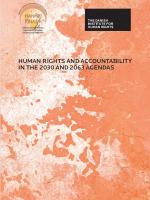
Human rights and accountability in the 2030 and 2063 agendas
Summary
This is a joint publication of the Network of African National Human Rights Institutions (NANHRI) and the Danish Institute for Human Rights (DIHR).
It aims to provide a practical overview of the 2030 Agenda for Sustainable Development and Agenda 2063 (The Africa We Want) in order to inform how the implementation and monitoring of these agendas play out in the regional African context, and how they relate to human rights.
The offers practitioners in both the human rights and development fields a practically-oriented analysis of the 2030 and 2063 Agendas, providing tools and examples for the development of a human rights-based approach to their implementation.
Key messages
- Both Agendas can contribute to the realisation of human rights. They are both explicitly grounded in human rights standards, albeit to different degrees, and based on this grounding in human rights, human rights standards and principles can also assess and guide their implementation.
- The guiding principles of both Agendas display many of the key features of a human rights-based approach to development (HRBA) including participation, accountability and non-discrimination. However they differ in their approaches and there are some key gaps from a human rights perspective. HRBA principles should therefore be used to guide their implementation and monitoring and address these gaps.
- The 2030 Agenda is explicitly grounded in the Declaration on the Right to Development. The 2063 Agenda explicitly reaffirms the right to development. The right to development is enshrined in the African Charter on Human and Peoples’ Rights and regional supervisory bodies have provided guidance on key principles for its implementation. This guidance can therefore complement and support key efforts for the implementation of both Agendas in the African region.
- A number of the regional bodies charged with overseeing the implementation of the 2063 and 2030 Agendas have a specific mandate in the area of human rights. This provides a unique opportunity for these institutions to ensure that this part of their mandate is also applied to the oversight of the implementation of both Agendas. These regional bodies include the African Union Commission, the African Peer Review Mechanism and the Regional Economic Communities.
- The extent of the linkages between human rights standards and the 2030 and 2063 Agendas paves the way for human rights supervision and oversight mechanisms to play a much larger role in the monitoring of the 2030 and 2063 Agendas.
- Combining reporting on sustainable development and human rights can help to avoid duplication of efforts, and increase efficiency in reporting, as well as ensuring a closer linking of issues related to the implementation of the 2030 and 2063 Agendas with human rights. Moreover, it has an advantage of ensuring national anchorage - a key principle of both the 2030 and 2063 Agendas. Therefore, states and other actors can make use of these synergies by integrating their SDG and Agenda 2063 reporting with their human rights reporting.
- The independent nature of National Human Rights Institutions, their bridging role between their country and the international human rights system, and their experience and expertise in monitoring and reporting on the implementation of human rights standards, places them in the perfect position to support accountability for the implementation of the 2030 and 2063 Agendas. Many African NHRIs are already undertaking relevant work in this regard.
We strive to make the pdf versions of our publications etc. accessible for screen readers. If you experience any problems, please contact Digital Editor Stine Juhl Nielsen on stni@humanrights.dk
